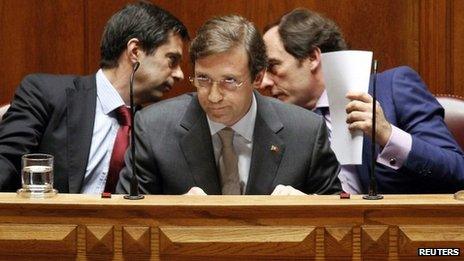Portugal's austerity government feels the pinch
- Published

Prime Minister Coelho (C) has been left vulnerable after the resignations of Finance Minister Vitor Gaspar (L) and Foreign Minister Paulo Portas (R)
The resignation in quick succession of two of Portugal's biggest political beasts has left many questioning whether the right-of-centre government, which has enthusiastically embraced austerity measures, can survive much longer.
In a statement to the nation on Tuesday night, Prime Minister Pedro Passos Coelho pledged to stay the course, saying the country desperately needed political stability in the current economic crisis.
He said it would be "hasty" to accept the resignation tendered hours earlier by Foreign Minister Paulo Portas, who also leads the junior partner in the two-party governing coalition, and that he had therefore not asked the country's president to relieve Mr Portas of his duties.
But Portuguese political commentators expressed scepticism that Mr Portas might go back on a decision that he described in his resignation statement as "irrevocable".
He also said it was one of conscience, resulting from the fact that he had argued against the prime minister's choice of new finance minister but his advice was not taken.
Mr Portas announced his resignation minutes before Maria Luis Albuquerque was formally appointed finance minister to replace VÃtor Gaspar.
Mr Gaspar resigned on Monday citing:
"significant erosion" in public support for the policies he believed were necessary to clean up Portuguese state finances
the Constitutional Court's rulings against parts of two successive annual state budgets, and
Portugal's failure for two years running to hit the budget deficit targets originally set by officials overseeing its eurozone bailout.
These factors, he said, meant he lacked the authority to stay on.
The prime minister's choice of Ms Albuquerque, who until Monday was Mr Gaspar's treasury secretary and is almost as closely associated with austerity as her boss, to succeed him, was taken as a clear signal that the current economic policies would continue.
In his own resignation statement, Mr Portas publicly baulked at that prospect, arguing that the reshuffle should have been seen as an opportunity to "open a different political and economic cycle" - in other words to break with the hard-core austerity pursued by Mr Gaspar.
He himself had recently been charged with overseeing the drafting of plans for far-reaching reform of the state that were expected to entail billions of euros in spending cuts over the next few years.
Trouble ahead
Portugal is suffering its worst economic recession since the 1970s, with a jobless rate at almost 18%. With youth employment more than twice that level, tens of thousands of members of the country's most highly educated generation have been leaving to seek work abroad.
Like her predecessor, new Finance Minister Maria Luis Albuquerque is seen as wedded to austerity
Though the yields on Portugal's bonds had been falling fairly steadily this year, the outlook for the economy now looks bleaker than it did in January, and both the government and international institutions have repeatedly downgraded their forecasts for growth - and raised those for state indebtedness.
The outlook for the government, meanwhile, now looks bleak - not to mention that for the economy.
Mr Portas had been designated number two in the government as a result of Mr Gaspar's departure, but retained that status for less than than a day.
His move took many in his own party by surprise, but the party's ministers were notably absent from the ceremony on Tuesday afternoon at which Ms Albuquerque was appointed.
The prime minister's centre-right Social Democratic Party (PSD) alone does not have a majority in parliament. It was already trailing the opposition Socialist Party in the polls, with some showing the Socialists garnering as much support as the PSD and the People's Party combined.
There is also a new-found unity outside of parliament, with the country's two main trade union federations joining forces in a general strike last week.
Many activists for the governing parties were already dreading September's local council elections: although there is no direct link between such elections and national politics, the fallout from poor results at the local level can have significant national ramifications.
Back in December 2001, Antonio Guterres resigned as prime minister after disastrous local election results for his Socialist Party. Portugal's president then dissolved parliament and called early elections, which were won by the PSD.
In the current circumstances of widespread disillusionment with the established parties, though, many observers worry that early elections would bring no clear results - just at a time when the country needs a sense of direction and confidence.